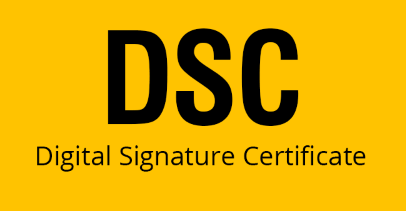DSC Full Form | What is Digital Signature Certificate
What is the full form of DSC
DSC: Digital Signature Certificate
DSC stands for Digital Signature Certificate. It is the digital equivalent of a physical or a paper document. For example, driving licence, passport, and membership cards. This certificate acts as a proof of identity of an individual for a specific purpose, e.g., a driving licence identifies a person who can legally drive the vehicle in a particular country specified in the licence. Furthermore, a digital signature can be presented electronically to prove one's identity, to access information on the internet and to sign a document digitally.

A digital signature certificate contains information about the user's name, pin code, country, email address, date of issuance, the expiry date of the certificate, and name of the issuing authority. It is a secure digital key which is issued by the certifying authorities to validate and certify the identity of a person holding this certificate. Digital signatures are created by using public-key encryption.
Benefits of a digital signature certificate:
- Authentication: It can be used to authenticate the personal information and details of a person while doing business online.
- Reduced cost and time: You can digitally sign a PDF file and send it to the receiver quickly, instead of signing a hard copy of a document and scanning it to send by email. Furthermore, the digital signature certificate holder is not required to present physically to authorize a business.
- Data integrity: The digitally signed documents cannot be altered or edited, so the date remains safe and secure.
Types/Classes of DSC:
Digital Signature Certificates are issued by a licenced Certifying Authority (CA) who has the licence to issue a digital signature certificate under section 24 of the Indian IT-Act 2000. Depending on the purpose or need for which DSC is required, it can be of the following three types:
Class 1 Certificate: This certificate confirms that the information in the application provided by the subscriber matches with the information stored in the consumer database. For example, when you log in to your social media account, your id and password are verified if they match you can log in.
Class 1 Certificate:Class 2 Certificate: This certificate also verifies a person against a trusted, pre-verified database. This certificate is relevant to situations where the risks and consequences of data compromise are moderate. For example, during transactions that may have substantial monetary value or risk of fraud, or include access to private information. The type of certificate is generally issued to the director and signatory authorities of a company or an organization. It is mandatory when you need to sign manual documents while filing of return with the ROC.
Class 2 Certificate:Class 3 Certificate: This is the highest level certificate and to get it the person needs to present himself in front of a Registration Authority (RA) and prove his/her identity only then it is issued. These certificates are used in online participation/bidding in e-auctions, online tenders, etc. So, the vendors who participate in online tenders must have a Class 3 certificate. These are required where the consequences of the failure of security services are high.
Class 3 Certificate: